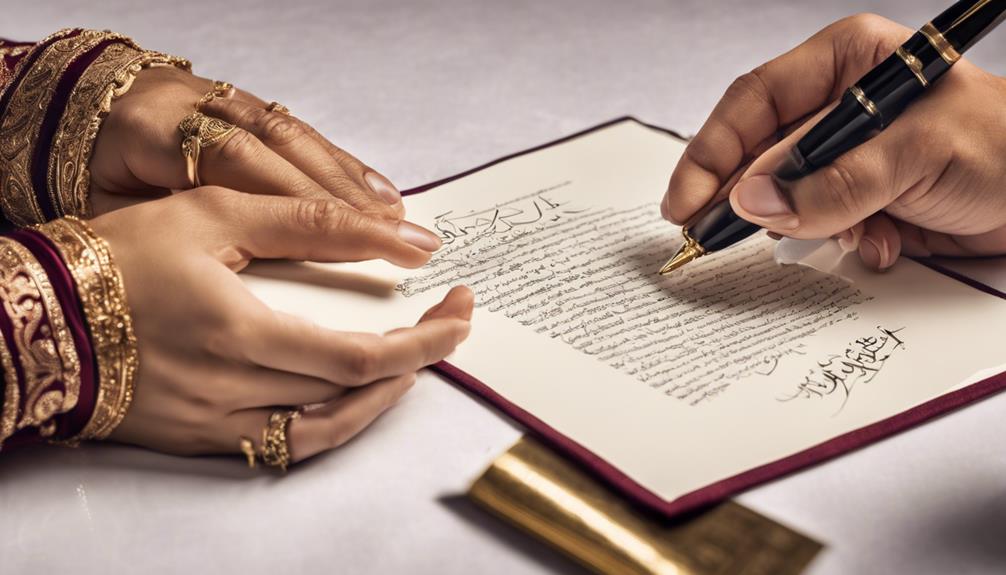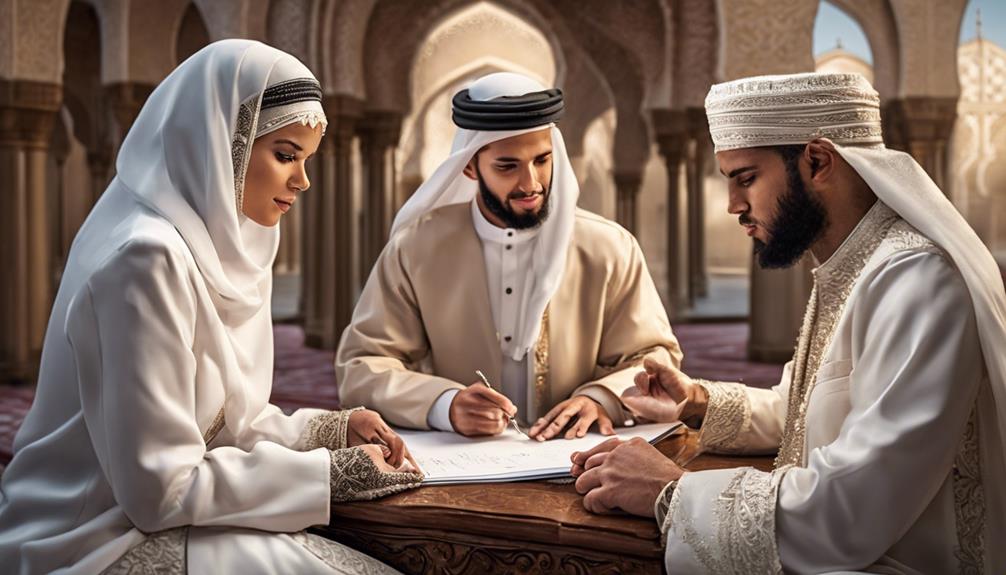Islamic prenuptial agreements help Muslim couples entering marriage by clarifying their rights, responsibilities, and potential scenarios. The inclusion of Mahr in prenups not only ensures financial protection for the wife but also symbolizes the husband’s commitment. Drafting the agreement involves specific clauses outlining financial responsibilities, consultation with experts, and addressing scenarios like polygamy. Inheritance rights are established in accordance with Quranic guidelines, and provisions are made for guardianship arrangements. Additionally, divorce clauses outline procedures and reconciliation steps, while custody agreements prioritize the well-being of children. It is important to finalize the agreement with notarization, clearly defined financial obligations, dispute resolution processes, and fair asset distribution. Transparency and fairness should be maintained throughout the entire process.
Key Takeaways
- Consult with legal and religious experts for guidance.
- Include specific clauses for financial responsibilities.
- Address custody arrangements, inheritance, and divorce procedures.
- Ensure mahr conditions are clearly stated to avoid misunderstandings.
- Prioritize children's rights, guardianship, and education in the agreement.
Understanding Islamic Prenuptial Agreements
Understanding Islamic Prenuptial Agreements enhances clarity and security for Muslim couples entering into marriage. These agreements serve as essential tools to safeguard the rights of individuals within the marriage, especially during divorce proceedings. Imam Yusuf Ziya Kavakci strongly recommends that Muslim couples establish prenuptial agreements to guarantee compliance with Islamic principles. By aligning the agreements with Islamic beliefs and teachings, couples can establish a clear framework for conflict resolution in the future.
Notarized prenuptial agreements play a critical role in ensuring that the outlined rights within the agreement are in accordance with Islamic teachings. This additional step adds a layer of legal protection and assures that the agreement holds up under Islamic law. As modern Muslim couples increasingly opt for prenuptial agreements to address financial matters and conflicts related to the Mahr in Islamic marriages, understanding the intricacies of these agreements becomes crucial for a successful and harmonious union.
Importance of Mahr in Prenups

Mahr in Islamic prenuptial agreements serves as an important symbol of financial security and commitment within the marriage contract. The Mahr, a mandatory gift from the husband to the wife, is agreed upon by the couple before the Nikah ceremony. It represents the bride's right and can be either monetary or non-monetary. Enforcing the Mahr agreement in divorce proceedings is vital as it guarantees the wife's financial protection and honor.
| Importance of Mahr | Description |
|---|---|
| Financial Security | Ensures the wife's financial protection. |
| Commitment | Symbolizes the commitment of the husband. |
| Honor | Upholds the honor and respect for the wife. |
The Mahr amount signifies the husband's commitment to providing for his wife's needs and serves as a form of security for her future. Understanding the significance of Mahr in Islamic prenuptial agreements is essential for couples entering into a marriage contract.
Drafting the Prenuptial Agreement

When drafting a prenuptial agreement in an Islamic marriage, it's important to include specific clauses outlining financial responsibilities, asset division, and dispute resolution methods. The following are vital considerations when crafting this important document:
- Clearly state the conditions for mahr, including the amount and terms of payment, to avoid misunderstandings in the future.
- Consult with legal and religious experts to make certain the agreement aligns with Islamic principles and local laws.
- Address potential scenarios like polygamy, custody of children, and inheritance rights to safeguard both parties' interests.
Inheritance Rights and Provisions

Islamic prenuptial agreements can address crucial points related to inheritance rights and provisions. These agreements may include rules for distributing inheritance, establishing guardianship arrangements for minors, and implementing asset protection strategies.
Inheritance Distribution Rules
In Islam, the Quran and Hadith provide specific guidelines for the important distribution of inheritance among heirs, ensuring equitable shares for close relatives like parents, spouses, and children.
- Quran specifies fixed shares for close relatives.
- Islamic inheritance laws ensure just distribution.
- Detailed guidelines for daughters, sons, and parents are included.
Understanding these rules is essential for Muslims to uphold the proper distribution of wealth in accordance with Islamic principles.
Guardianship Arrangements for Minors
Guardianship arrangements for minors in Islamic prenuptial agreements outline specific provisions for ensuring the financial security and well-being of the children involved. In Islam, minors have specific inheritance rights that must be upheld according to Islamic law. These provisions within prenuptial agreements address the minors' inheritance shares and care, ensuring they receive their essential financial support.
Islamic prenuptial agreements can also specify guardianship arrangements for minors in scenarios such as divorce or death, safeguarding their well-being and financial stability. It's important to understand and document minors' inheritance rights thoroughly to create thorough prenuptial agreements that protect the interests of the children involved.
Asset Protection Strategies
Asset protection strategies in prenuptial agreements encompass provisions for inheritance rights and fair asset distribution among spouses and heirs.
- Specify inheritance rights to protect assets.
- Outline fair distribution among spouses and heirs.
- Address property, investments, and financial assets in distribution.
Divorce Clauses and Procedures

Divorce clauses in Islamic prenuptial agreements serve to outline the grounds and procedures for divorce, including arbitration and financial settlements. They play an essential role in documenting the clarity of divorce grounds and procedures, ensuring that both parties understand their rights and responsibilities in case of dissolution.
Divorce Grounds Clarity
When outlining divorce grounds and procedures in Islamic prenuptial agreements, it's important to specify acceptable reasons based on Islamic principles and teachings. This clarity guarantees that both parties understand the conditions under which divorce is permissible.
To maintain the audience's interest, three vital aspects should be considered:
- Incorporate reconciliation steps before initiating divorce proceedings.
- Define financial responsibilities and asset distribution in the event of divorce.
- Follow a structured process outlined in the prenuptial agreement to adhere to Islamic guidelines effectively.
Procedure Documentation Importance
Documenting divorce procedures in Islamic prenuptial agreements is vital to guarantee transparency and fairness in the event of marital dissolution. These clauses outline the steps and conditions for divorce, including grounds for dissolution and asset division. They may also include provisions for arbitration, mediation, or counseling. By clearly documenting these procedures, couples establish clarity and fairness in case of divorce.
Post-divorce responsibilities and financial arrangements are essential components of Islamic prenups, emphasizing the importance of thorough documentation. Having a well-documented plan in place can help prevent misunderstandings and disputes during the emotional process of divorce, providing a structured framework for both parties to follow.
Custody and Childrens Rights

Prioritizing the well-being and rights of children, Islamic prenuptial agreements incorporate detailed custody arrangements. These agreements aim to guarantee the stability and protection of children by addressing various aspects related to their care and upbringing.
Here are three key points regarding custody and children's rights in Islamic prenuptial agreements:
- Specific clauses can outline custody responsibilities, visitation schedules, and decision-making authority.
- The agreement may address factors like children's education, healthcare, and religious upbringing.
- Islamic prenups can designate guardianship in case of divorce or unforeseen circumstances affecting children.
Finalizing the Prenuptial Agreement

To complete the prenuptial agreement, both parties must make sure all terms are finalized and legally binding. This includes ensuring the document is notarized for legal validity and contains specific clauses addressing financial obligations, asset distribution, dispute resolution procedures, and the division of marital property. Additionally, it is critical to specify conditions for the termination of the agreement, such as in cases of divorce or death. Seeking legal advice is paramount to guarantee the agreement complies with both Islamic principles and local laws. A well-structured prenuptial agreement provides clarity and security for both parties involved.
| Finalizing the Prenuptial Agreement | ||
|---|---|---|
| Ensure Notarization | Include Financial Obligations | Outline Dispute Resolution |
| Address Asset Distribution | Specify Termination Conditions | Seek Legal Advice |
Frequently Asked Questions
Can You Get a Prenuptial Agreement in Islam?
Yes, in Islam, individuals can get a prenuptial agreement, known as 'Aqd al-Nikah', which safeguards rights by addressing financial matters, property distribution, and more in line with Islamic principles. Consent from both parties is crucial.
What Is the Difference Between a Prenuptial Agreement and a Nikah?
A prenuptial agreement is a legal contract focusing on financial rights during divorce, while a Nikah is an Islamic marriage contract encompassing religious duties. Prenuptial agreements address asset division, whereas a Nikah emphasizes Islamic principles.
How to Perform Islam Marriage Step by Step?
To conduct an Islamic marriage, verify legality, consent, and absence of coercion. Confirm both parties' legal age, prohibited relations, and family blessings. Have representatives present for the bride and groom during the ceremony.
Do I Have to Tell My Wife About My 2nd Wife in Islam?
In Islam, it is obligatory to inform one's current wife about taking a second wife. Open communication about polygamous intentions is important for trust and harmony in relationships. Seeking guidance from knowledgeable sources can help navigate complexities.
Conclusion
To sum up, Islamic prenuptial agreements are an essential step in ensuring the rights and responsibilities of both parties are clearly defined.
While they may seem intimidating, with proper guidance and understanding, drafting a prenup can be a straightforward process.
Remember, it's always better to plan for the unexpected than to be caught off guard.
So, embrace the irony of preparing for the worst while hoping for the best in your journey towards a successful marriage.










